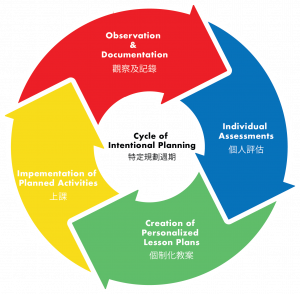When children are treated as individuals with unique needs, it becomes clear that a ‘one-size-fits-all’ curriculum is quite ineffective. This is especially the case with younger children, as they have yet to discover their own interests, strengths, and weaknesses. These problems can be solved by implementing an Intentional Curriculum.
What is an Intentional Curriculum?
An intentional curriculum is built on the philosophy of relating to children while building their strengths, interests, ideas, and needs. Each lesson plan is personalized for each student’s unique needs through the cycle of intentional planning, which follow these basic steps:
- Observing children to track and document how they are learning.
- Conducting individual assessments based on observations.
- Creating personalized lesson plans based on what the children are ready to learn.
- Implementing intentionally planned activities and continue to document what children are learning and thus, the cycle continues.
The importance of an intentional curriculum
An intentional curriculum is designed by utilizing assessment data and paying particular attention to specific learning indicators of what children are ready to learn next. Research tells us that an intentional curriculum will enhance a child’s learning potential by growing with each child and extending their thinking and understanding of different experiences throughout their early learning experiences.
To sum up…
High-quality early childhood development and learning has a profound, lasting influence on student achievement and life outcomes. Our proprietary curricula, from infants to school-age children, are aligned to provide a seamless School Readiness Pathway that accomplishes this goal.
Sources
https://www.tutortime.com.hk/ourcurriculum/cycle-of-intentional-planning/
https://www.tutortime.com/blog/2015/08/the-long-term-benefits-of-an-intentional-curriculum/

